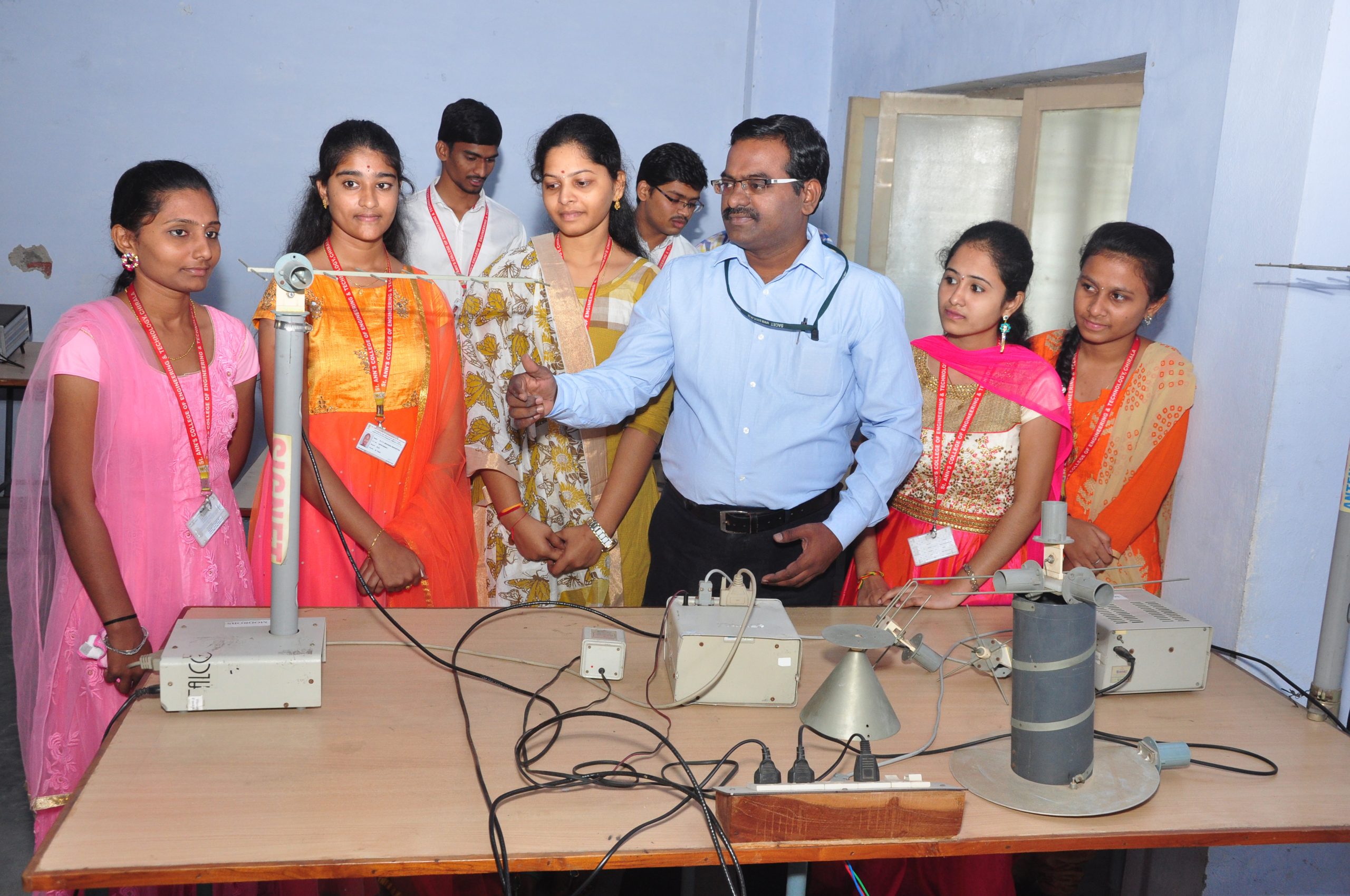ELECTRONICS & COMMUNICATION ENGINEERING concerned with the practical applications of Electronics Good at detail-oriented jobs. Basic research in physics, other sciences
ABOUT THE DEPARTMENT
The Department of Electronics & Communication Engineering was established in the year 2001 with an intake of 60 students and the current intake of the department is 240. The department has well qualified and experienced faculty members and majority of the faculty members are ratified by the JNTUK, Kakinada University. The department has state-of-the-art laboratory equipment like GPS trainer, Satellite trainer, Antenna trainer, RFID system etc. to enrich the students in the field of Electronics & Commination Engineering. The department received three IRNSS receivers from ISRO to explore more on Indian navigation system. The department also offers M.Tech. Program with Embedded systems (ES) specialization with an intake of 24.


ABOUT HEAD OF THE DEPARTMENT

Dr.D.Rajendra Prasad has received Ph.D in Electronics & Communication Engineering in 2017 from JNTUK Kakinada, Andhra Pradesh. He has a total of 24 years of experience in Teaching and Administration He is currently working as Professor and Head, department of ECE in St.Ann’s College of Engineering and Technology (Autonomus), Chirala, Andhra Pradesh, India. He is ratified by JNTUK, Kakinada in 2010. He has published his work in 43 refereed International journals and International conference proceedings. He is an active reviewer for various reputed journals like IEEE access, IEEE systems journal, IEEE journal of biomedical and health informatics, International journal of communication systems etc,. His Research areas include Wireless Communications, Wireless sensor Networks, Antennas & Internet of Things. He is a (Fellow) member of various professional bodies like FIETE, IAENG, SDIWC, IE, and ISTE.
VISION
To produce globally competitive engineering graduates through high quality education, to instill high standards of ethics and professionalism and to bring out quality research in the frontier areas of Electronics & Communication Engineering.
MISSION
To impart high quality technical education to all students .
To become active life-long learners with the necessary skills, competencies, and ethical values.
To develop human power with creativity, innovation and research.
To inculcate value-based, socially committed professionalism to the cause of overall development of students and society.
- Programme Educational Objectives (PEO’s)
- Programme Outcomes (PO’s)
- Programme Specific Outcomes (PSO’s)
- BOS
PEO-I: To acquire fundamental knowledge in basic and applied engineering sciences to formulate and solve problems related to Electronics & Communication Engineering.
PEO-II: To develop theoretical and practical knowledge in Electronics & Communication Engineering courses to design/innovate and create novel products/ solutions to real life problems.
PEO-III: To exhibit professionalism, multidisciplinary approach and ethical attitude with good managerial and entrepreneur skills to meet the needs of industry and society.
PEO-IV: To recognize the need for research, further studies and continuous learning to adopt oneself in the ever growing technological scenario.
Engineering Graduates will be able to:
PO1.Engineering Knowledge: Apply the knowledge of mathematics, science, engineering fundamentals, and an engineering specializationto the solution of complex engineering problems.
PO2.Problem Analysis: Identify, formulate, review research literature, and analyze complex engineering problems reaching substantiated conclusions using first principles of mathematics, natural sciences, and engineering sciences.
PO3. Design/development of solutions: Design solutions for complex engineeringproblemsand design system components or processes that meet the specified needs with appropriate consideration for the public health and safety, and the cultural, societal, and environmental considerations.
PO4.Conduct investigations of complex problems: Use research-based knowledge and research methods including design of experiments, analysis and interpretation of data, and synthesis of the information to provide valid conclusions.
PO5. Modern tool usage: Create, select, and apply appropriate techniques, resources, and modern engineering and IT tools including prediction and modelling to complex engineering activities with an understanding of the limitations.
PO6. The engineer and society: Apply reasoning informed by the contextual knowledge to assess societal, health, safety, legal and cultural issues and the consequent responsibilities relevant to theprofessional engineering practice.
PO7. Environment and sustainability: Understand the impact of the professionalengineering solutions in societal and environmental contexts, and demonstrate the knowledge of, and need for sustainable development.
PO8. Ethics: Apply ethical principles and commit to professional ethics and responsibilities and norms of the engineering practice.
PO9. Individual and team work: Function effectively as an individual, and as a member or leader in diverse teams, and in multidisciplinary settings.
PO10. Communication: Communicate effectively on complex engineering activities with the engineering community and with society at large, such as, being able to comprehend and write effective reports and design documentation, make effective presentations, and give and receive clear instructions.
PO11. Project management and finance: Demonstrate knowledge and understanding of the engineering and management principles and apply these to one’s own work, as a member and leader in a team, to manage projects and in multidisciplinary environments.
PO12. Life-long learning: Recognize the need for, and have the preparationand ability to engage in independent and life-long learning in the broadest context of technological change.
PSO1. Take up challenges in the fields of VLSI design, Embedded Systems, IOT and related fields.
PSO2. Acquire competency in the fields of Wireless Communications, Antennas and Computer Vision in furtherance to research activities
PSO3. Design and develop innovative circuits and systems using modern tools for industrial applications
PSO4. Ability to solve societal problems with ethical responsibility and acquire leadership skills.
Faculty
Click Here for Faculty Details
Curricullum
Click here to Download Curricullum
Laboratories
Click Here for Laboratory Information
